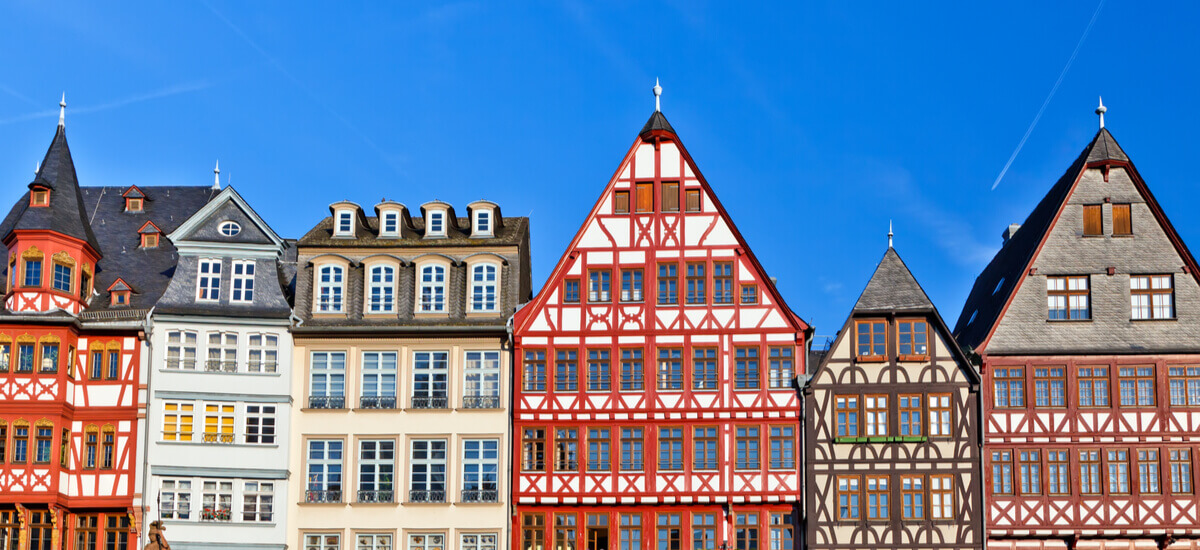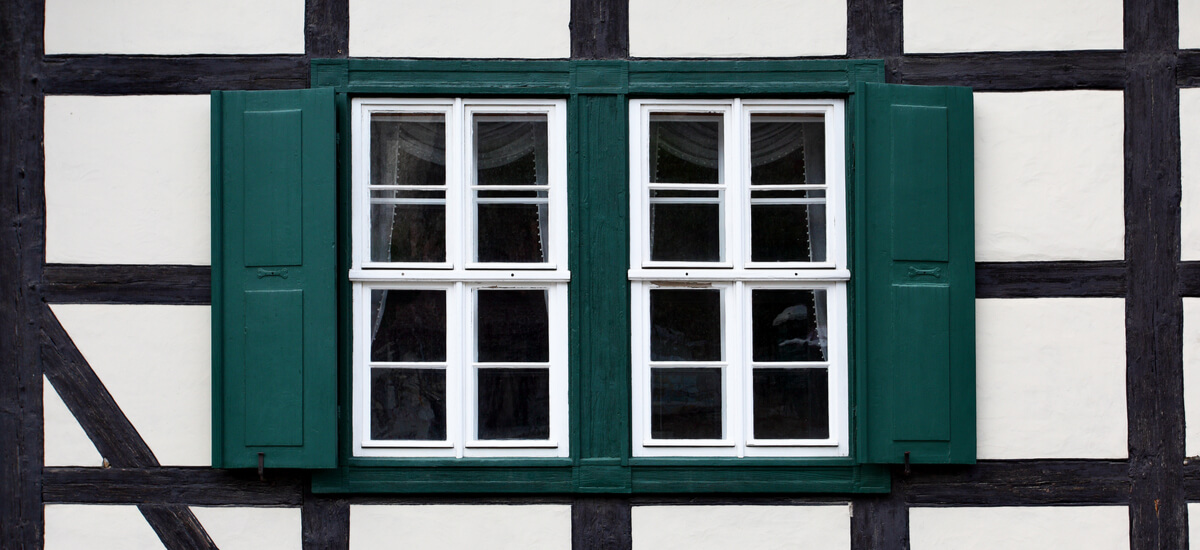How much is a security deposit? 2025 guide
Everything you need to know about security deposits

If you’re considering buying real estate in Germany, you’ll have a choice of properties in large metropolitan cities, historic towns or a more rural setting entirely.
The German property market saw huge gains recently but is predicted to slow in 2023¹ — which could mean that there are some great options for foreigners who want to buy real estate in Germany and know where to look.
If you’re thinking of a move to Germany, then you’ll need to know a bit about how the process of buying a home in Germany as an expat will work. Here’s a quick guide.
Germany’s property market has seen huge recent gains — with prices rising by 10% on average in 2021¹.
However, in recent reports looking at what’s likely to happen in 2023 and beyond, analysts predict a slow down, with overall prices losing about 3.5% in 2023 before stabilizing in 2024.
Of course, predictions don’t always tell the whole story — but with costs of living and borrowing money rising, Germany is among many developed economies where the real estate market is cooling right now.
If you’re wondering how to live in Germany, the fact that property prices are coming down could be an upside. Analysts are predicting a price correction rather than a crash, so smart buyers may well still be able to find a perfect property as an investment or to live in themselves.
There are no special requirements nor paperwork for foreigners wishing to buy property in Germany, so you shouldn’t have any issues.
Foreigners can also buy land in Germany — so if you’ve been dreaming of building your very own place, you could still be in luck.
Of course, buying land to develop does come with a whole other set of rules you’ll need to check out, such as what property types can be built where, and how much construction, legal fees and taxes will cost.
Now that we covered all the basic costs of purchasing your dream German home, the only question left is: how to send money to pay for your property overseas?
Wise offers you a quick, secure and transparent way of sending money to Germany. You get the mid-market exchange rate for your payments and see how much it’s charged for the transfer before sending the money from your bank*.
With the Wise Account you can also hold, send and spend money in over 50 countries, and receive like a local in 10 different currencies.
Get your Wise Account
in minutes 🌐
Buying a property in Germany isn't too dissimilar to buying a home elsewhere in North America or Europe. Here’s an outline of what you’ll need to do.
Let’s assume you’ve done a lot of the hard work already, including setting your budget, viewing properties, and finding the right fit for your needs. Now you’ve got to make an offer which the seller will accept.
This is where having a great realtor on side can help you as the buyer, as you’ll be able to ask for specific local advice about how much to offer, to make sure you get the best available deal.
Good news! The seller agreed to your offer. It’s normal practice to get a mortgage agreement in principle in advance of making an offer, but you’ll need to finish up the mortgage process now.
It’s also worth remembering that as a non-resident you might find that you’re only offered a relatively low mortgage amount (in the region of 60% of the property price). This will mean that you may need to pay up to 40% of the purchase price upfront as a deposit, which is a hefty amount.
Once you’ve found the right home for you, you’ll have to hand over details of the property such as a property assessment and proof of current ownership from the Land Register. You’ll also have to prove your ability to service the mortgage, by showing your payslips or evidence of your net worth.
You may also decide it’s a good idea to open a German bank account if you’re planning on moving to Germany yourself — although an alternative online provider like Wise can also be a great bet for managing your money across dollars, euros and more.
Once everything is set, you’ll need to have your notary (notar) draw up the sale contract, which you’ll sign along with the seller.
At this stage you’ll also normally pay a deposit or down payment to secure the house while any final checks are carried out. In most cases there’s a mandatory 14 day wait between getting the draft of the sales contract and closing the sale, to allow for legal checks to be completed.
Your notary can support you in completing due diligence checks on the property, and any required searches and surveys, to make sure the process runs smoothly.
You’re almost there now. As long as everything is running smoothly, you’ll now all have signed the contract, and the notary can register the sale. All that’s left to do is pay.
If you’re not yet in Germany, you might have to pay from abroad with an international money transfer. If you’re transferring a large amount of money across currencies, it’s important you get the best deal available.
| 💡 One smart option is to send money online with Wise. You'll cut on the fees charged by the banks, avoiding hidden mark-ups and SWIFT fees from intermediary banks*. |
|---|
See how much you may save with a Wise Account:
It’s time to get your keys and move in. Within a month, you also have to pay the property sale tax (3.5 - 6.5% of the purchase price), so do make sure you familiarize yourself with the legal requirements based on your residence situation.
If you’re thinking of buying a property in Germany, the price you pay will be influenced significantly by where you want to live. As this table shows, location really matters.
Here’s a rundown of the cost per square foot to buy a property in Germany across 5 different major cities.
| Cost in city center (sqft) | Cost outside of city center (sqft) | |
|---|---|---|
| Berlin² | 785.80 USD | 526.27 USD |
| Dusseldorf³ | 647.35 USD | 530.11 USD |
| Frankfurt² | 957.05 USD | 684.07 USD |
| Hamburg³ | 840.87 USD | 541.69 USD |
| Munich⁴ | 1,199.26 USD | 880.55 USD |
Note: data taken from Numbeo⁵ on 6th December 2022 — Numbeo aggregates live cost of living data from people living in cities around the world. Check Numbeo for the latest information from the cities you’re interested in
Once you add up all of the fees you’ll have to pay as a buyer, you can expect to add around 10% of the property price onto your bill. Fees and taxes include⁶:
| 🏡 Taxes and fees | % |
|---|---|
| Property sale tax (Grunderwerbsteuer) | In the region of 3.5 - 6.5% |
| Notary fees | Usually 1.2 - 1.5% depending on the circumstance |
| Registration fees | Normally 0.8 - 1.2% |
| Estate agent fees | If you agree to share these with the seller, you’ll need to pay for them. Typically they’ll be 1.5 - 3% (but can go up to a huge 6%) of the purchase price, plus VAT at 19 percent
|
| Exchange rate | Varies according to provider, make sure you’re not being overcharged by using a transfer service that offers the mid-market exchange rate |
💡 Banks usually add a spread on the mid-market exchange rate and overcharge on international transfers. Make sure to get the most EUR from your USD by using Wise, a cheap and transparent way of moving your money abroad. |
|---|
Spend less on
international transfers

There are several avenues you can take to find a property in Germany:
- Through an agent (immobilienhändler or makler)
- Through an online portal which puts owners directly in touch with prospective tenants
- Through word of mouth
An estate agent, if used, generally works on behalf of the seller. However, as the prospective buyer, you can also choose to use a buying agent to help you. The estate agent fees are likely to be between 1.5 and 3% of the price of the property. These are usually paid by the seller, or split between the buyer and the seller.
If it’s the first time you’ve bought a property in Germany, then a specialist agent might offer helpful advice and insight into the local market. However, there will be a fee to pay for this service, and you should make sure you’re clear on what you’ll get for your money, as both the packages and prices vary wildly.
| Check out these websites to get started |
|---|
|
Ask for local advice and recommendations for a broker, to avoid scams and pitfalls. Looking for membership of a professional body is another good choice.
The IVD is an association of German realtors¹⁰, which has over 6,000 direct members. Choosing an agent who holds this membership should make sure you don’t fall foul of any scammers.
One other important thing to look out for if you’re buying an apartment is Hausgeld — essentially management and maintenance fees. This will be detailed in the contract, and available from the seller — but worth a good read to make sure there are no surprises once you finalize the purchase.
Some other good ways to get an insight into what the property you’re looking at is really like include searching for minutes of an owners’ association meeting (if there is one), and talking to existing residents if you’re buying an apartment.
| Property checklist |
|---|
✅ Check with the seller if there are ongoing management or maintenance fees to pay (for apartments, for example), or any extraordinary maintenance costs which can be expected for one off works ✅ If the building has a basement check for signs of damp, and take a good look round communal areas and stairwells if you’re buying an apartment ✅ If you’re buying an older house ask how old the roof is and when the electrics were last checked — these can be major costs if they’re required after you move in ✅ Visit the property several times if you can, at different times of day, to check the neighborhood and how the place feels ✅ Buying a place that’s currently occupied can be problematic as it can be very difficult to force the sitting tenants to move on without a full eviction process. Be wary if this is the case for your chosen property |
Germany has a well developed real estate sector. This means you'll have a wide choice of apartments, houses or even land if you want to build your dream home yourself.
Naturally, you'll find more apartments available in built up areas and cities, with houses and villas more readily available in newer developments in the suburbs, and in towns and villages.
It’s a smart idea, though not required by law, to get a survey done on any property you choose, before you commit to buying it.
Older houses in particular can have hidden problems which are costly to fix. Find a registered surveyor online¹¹, or ask for recommendations from local connections to double check the property.
Yes. You can build your own home in Germany if you’d prefer.
One obvious benefit is that many of the fees payable when purchasing will apply only to the cost of the land rather than the actual building — but building a home in a new country is a major task which will require local support and a lot of patience.
You’ll need to get a building permit — Baugenehmigung — to make sure your finished home is legal.
There are some legal requirements around the property sale process in Germany, including the role of the notary which is very codified.
The notary is primarily tasked with upholding German law, rather than particularly supporting the buyer or seller, and will make sure the property can be legally sold among other things.
Before the sale is legally valid, the notary will draft a sales contract and check the understanding of all parties involved.
That said — you can pick any notary you like, so finding someone you trust, and who can speak English well, is a good start.

The process of buying a home — and moving in — will be different in Germany to what you may be used to in the US. Here are a few things to consider:
Building insurance is mandatory in Germany, so you’ll be obliged to get this set up as soon as you own a home.
If you’re in an apartment you might find that the mandatory insurance is included in the building maintenance and management fees you pay. Contents insurance is not needed by law — but still a smart idea.
Your mortgage provider may also require you to take out insurance against loss of earnings, to make sure the mortgage repayments are covered even if something goes wrong.
Don’t forget to set up all your utilities before you move into the property.
Essentials like water and gas can normally be switched directly from the previous owner, but you’ll want to shop around for other services, like internet.
|
|---|
Buying a property is a big — and exciting — step, but navigating the system in a new country can be a challenge.
Luckily, buying your dream home in Germany should be fairly straightforward if you follow these steps, and find the right local help if you need it.
Good luck with finding, buying and settling into your new home in Germany.
Sources:
*Please see Terms of Use for your region or visit Wise Fees & Pricing for the most up to date pricing and fee information
Sources checked on 12.09.2022
*Please see terms of use and product availability for your region or visit Wise fees and pricing for the most up to date pricing and fee information.
This publication is provided for general information purposes and does not constitute legal, tax or other professional advice from Wise Payments Limited or its subsidiaries and its affiliates, and it is not intended as a substitute for obtaining advice from a financial advisor or any other professional.
We make no representations, warranties or guarantees, whether expressed or implied, that the content in the publication is accurate, complete or up to date.

Everything you need to know about security deposits

Learn all about different ways to get an overseas property mortgage as an American and gain unique insights to prepare yourself for the whole process.

Get a full overview of the best property management software systems for small landlords to easily track and manage their overseas property.

How to buy your first rental property overseas? Here's a detailed guide that can help you understand the challenges and steps for making an investment.

What are the best property management software systems for managing student housing? Take a look at our list and choose the most suitable option for you.

Are you thinking about making smart property investment decisions and wondering how rental yield is calculated? Have a look at our guide to find out.